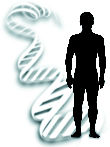
This web page was produced as an assignment for an undergraduate course at Davidson College.
Max L. Citrin’s Genomics Homepage
Bio 309: Genomics, Proteomics, and Bioinformatics
Fall 2004
Genomics Web Pages:
Popular Press vs. Scientific Literature: The Laziness Gene
Annotated and Non-Annotated Yeast Gene: SEC22/YLR268W and BOP2/YLR276W
Expression Pattern of Yeast Gene: YLR262C-A
Proteome Database Analysis of Yeast Gene: Proteome Analysis
Genomics Page
Biology Home Page
Email Questions of Comments.
 |
| Image adapted: U.S Department of Energy Human Genome Program |
Simplification has proclivity to transmogrify into egregious distortions of the facts. We see this problem frequently in press reports of scientific findings. Whether, intentional (to move product) or unintentional (caused by ignorance) such distortions vex and perplex the socially conscious scientist. Examples abound of lay misinformation. In the most recent Davidsonian, a student publication, one student began his article with the false statement: "since we know the function of every gene." We do not know the function of every gene. More importantly, we do not know how the function of each gene interacts with the function of every other gene (or to be more precise, some of the other genes). Genomics strives to understand the complexities of this very question: how does the entire genome of an individual get expressed as a phenotype. It is a gestalt enterprise. Genetic methods and the conclusions drawn from them have throughout history been, on the whole, reductionist. Geneticists strove to understand how alteration of single genes affects the phenotype. It focused on genetic disorders such as Cystic Fibrosis (casused by a mutation in one gene) and phenotypic traits such as hair color, which is also affected by only one or more genes. It shunned the exploration of more complex traits such as height. Genomics incorporates elements of physics, graph theory from mathematics, chemistry, biochemistry, and biology to explain more than just how individual genes are expressed, but how expression of genes at one locus interact with the expression of genes at another locus to affect the overall phenotype of an individual. Suffice it to say we have not even scratched the surface of understanding how all genes interact. The notion that we could clone a person is preposterous because gene expression would be different than in the original individual simply due to fetal imprinting and gene inactivation, as well as other environmental effects. Furthermore, the different gene expression would affect expression of other genes.
The seriousness of misunderstandings becomes apparent when we consider that the crux of the most constroversial social, political, and ethical issues rests on a sound comprehension of science. We cannot expect the public to come to educated decisions regarding therapeutic cloning, abortion, and other scientific controversies if we do not demand superior education of the public and seek out ways to achieve this goal. As long as educated and intelligent college students at the top universities and colleges in the country appear to be making decisions based on ignorance of the form :" we understand the function of every gene," we can only expect that a less well educated general populous, will will make decisions out of ignorance. Equally troubling is the fact that top colleges are the breeding ground for many future politicians. And apparently, many politicians make the same decisions shrouded in ignorance. Science is not conducted in a vacuum.
Recently, the media suggested that science might be onto the cure for laziness. The inferences that the media calls us to make are wrong. It would be nice to believe that we could inject our lives with energy, pep, and that go-getter attitude by simply tweaking with our genes. However, to tamper with one's supposed natural state offends the sensibilities of many. What appeals to most people more than the potential to change is the ability to explain one's shortcomings. "Oh...I know why I habitually fall short of my goals and have trouble enjoying my work, and am overweight. It is all in my genes." As if understanding why something happens makes it ok. As if the value of genetics is to make us feel good about ourselves. Like children we will believe the claims that make us feel good about ourselves and ignore the ones that don't. Pandering to this popular mentality will not raise understanding or awareness.
The idea that a single gene causes laziness is propagated by lies and false propoganda of this antagonostic publication system provoked by the petty pedantary of political pundits, ignorance, popular opinion, and prejudices learned by age 18.
Despite popular desire to be absolved of responsibility and/or to discover a quick fix people will find neither.
© Copyright 2004 Department of Biology, Davidson College, Davidson, NC 28035